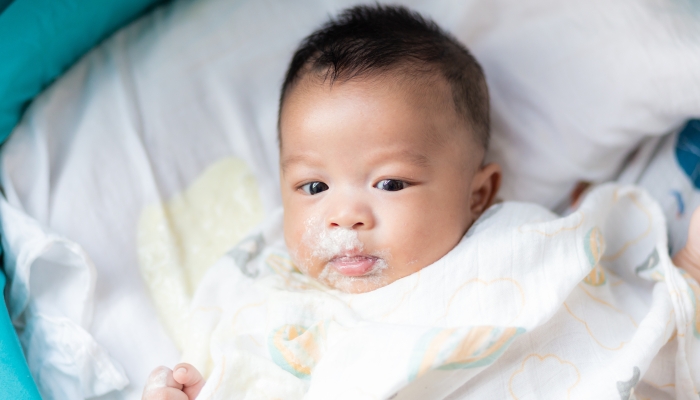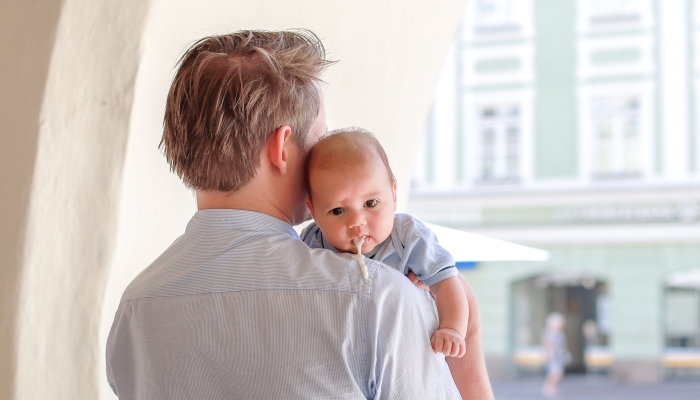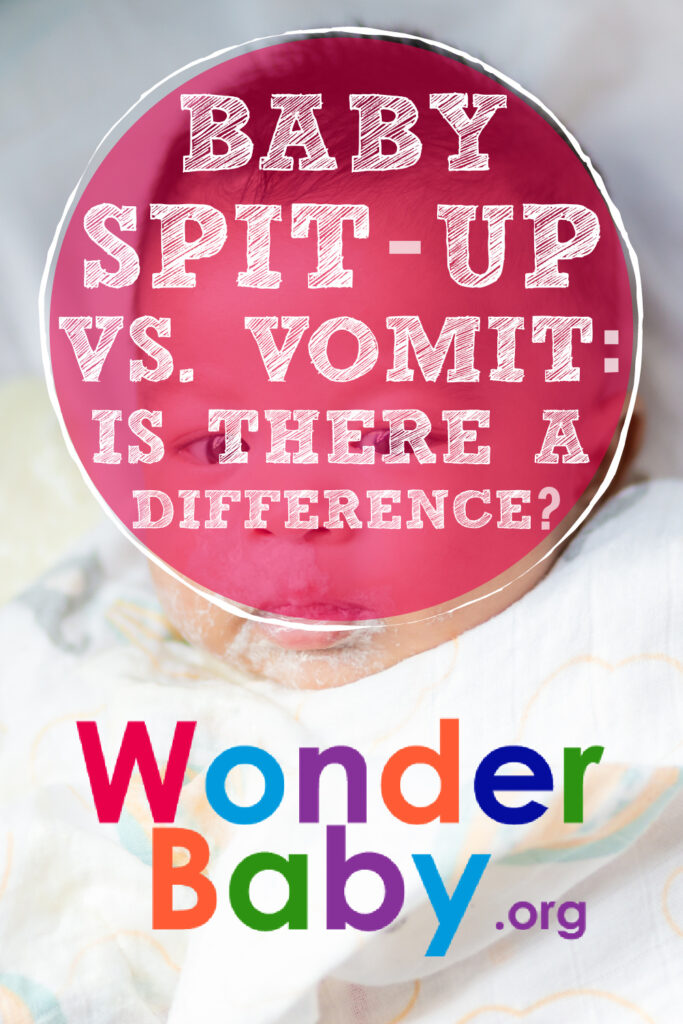Baby Spit-Up vs Vomit: Is There a Difference?

- It’s normal for babies to spit up until they are about 12 months old.
- Babies may spit up 10-12 times per day.
- Vomiting is more forceful than spitting up and is usually accompanied by crying or discomfort.
- Vomiting in babies indicates a health problem.
Most parents anticipate that they’ll need to pack a good supply of burp cloths, changes of clothes, and wet wipes everywhere they go. It’s not uncommon for healthy babies to spit up multiple times each day.
Vomiting, on the other hand, is not normal in babies. Babies who have forceful vomiting should be seen by their pediatrician.
As a new parent, you might be wondering how to tell the difference between baby spit-up and vomit. Baby vomiting and baby spit-up can seem similar at first, but there are a few key differences that parents can watch for.
Is Spitting Up and Vomiting in Babies the Same?
Spitting up and baby vomiting are not the same. While both have to do with stomach contents coming back up through the mouth, there is a difference between baby spit-up and infant vomiting.
It’s normal for babies to spit up every day, and some infants may even spit up 10–12 times per day, with the worst problem being dealing with all of the laundry. However, vomiting is always a sign of a problem. Just like with adults, vomiting happens when your baby is sick.
Baby Spit-Up vs Vomit: How to Tell the Difference
There are a few signs you can look for that your baby is vomiting, not just spitting up.
Spit-Up
Baby spit-up is usually passive and mild. The color of the spit-up may be light yellow, white, or even clear. Usually, babies who spit up frequently are referred to as “happy spitters” because they’re not bothered by spitting up.
Spitting up usually happens within 30 minutes after a feeding and can be accompanied by a burp.
Vomit
Vomiting is more forceful than spitting up. Projectile vomiting or forceful vomiting is never normal. The vomit may be the same color as spit-up, or it may have a green or brown color.
Babies usually cry and use their stomach muscles when they throw up. When your baby vomits, they will probably show signs of discomfort and may also have a fever or diarrhea.

Why Do Babies Spit Up and Vomit?
Knowing the difference between babies’ spit-up and vomit can help you decide whether to seek medical attention. It can also be helpful to know why babies spit up and vomit.
Spit-Up
Spit-up is a normal part of your baby’s development, but there are some things that might cause one baby to spit up more than another.
Gastroesophageal Reflux Disease
Gastroesophageal reflux is a common problem in infants and young babies. Some experts estimate that up to 1 in 5 babies suffers from gastroesophageal reflux disease (GERD). Incidence of GERD usually peaks at about 5 months old and resolves by 12-18 months.
While GERD is usually mild, some babies with severe GERD may experience frequent crying and trouble gaining weight.
Overfeeding
Overfeeding may cause babies to spit up some or even all of their last meal. A baby’s tummy can not hold much milk at a time, and the weak sphincter at the top of the stomach can’t stay closed if there is too much liquid inside. A 10-day-old baby has a stomach about the size of a golf ball and will only hold about 2 ounces of fluid at a time.
Babies who nurse or suck on a bottle for comfort are more likely to overeat and spit up. Avoid overfeeding by offering smaller feeds or by taking breaks every few minutes while nursing.
Swallowing Too Much Air
Just like having too much liquid in their bellies, babies who swallow too much air will also spit up. Stop to burp your baby every few minutes while they are eating to help them get the small bubbles out of their stomach.
Vomiting
Vomiting can have many different causes, and it is usually best to call your pediatrician to get help finding out exactly why your baby is throwing up.
Viral Illness
One of the most common reasons for a baby throwing up is a viral illness. Rotavirus, adenovirus, and norovirus are just a few of the common GI bugs that so often make babies sick.
Pyloric Stenosis
Pyloric stenosis is an uncommon but dangerous problem for small infants. Babies with pyloric stenosis have extremely forceful vomiting that gets progressively worse through the first weeks or months of life.
The Pyloric sphincter is an opening at the stomach exit. If it is too narrow, as in pyloric stenosis, milk or other food can not move down into the lower GI tract, and it is forced back up through the mouth. This condition is usually diagnosed by an ultrasound image.
Food Intolerances or Allergy
If your baby has food intolerances or allergies, they may experience persistent vomiting after meals. Other signs of food allergies include rashes, hives, or even difficulty breathing.
Lactose and soy intolerances are fairly common and can cause vomiting, diarrhea, and even blood in the stool. Food intolerances often resolve with age.
Allergies usually cause more serious reactions that include vomiting, face swelling, rashes, or difficulty breathing. If you think your baby is having an allergic reaction, seek immediate medical attention.
Parent’s Guide on Dealing With Baby Spit Up and Vomit

Knowing how to manage both normal spitting up and problematic vomiting can help both your and your baby’s well-being.
Frequent Burping
If your baby seems to struggle with keeping their stomach contents where they belong, try to hold your baby upright and burp them well every few minutes during a feeding. This will break up bubbles that get trapped in their stomach as well as slow them down and allow their body to digest their meal.
Slow Flow Bottle
Many babies with infant reflux or frequent spitting up do better with a slow-flow bottle. It may take practice at first, and your baby might get frustrated that they don’t get as much milk. Give them a few days of practice with a slow-flow nipple before you give up.
Avoid Problematic Foods
If your baby spits up enough to cause poor weight gain or even weight loss, you may have to consider changing formula brands or eliminating foods from your own diet if you are breastfeeding.
Breastfeeding mothers can try eliminating dairy products and soy from their diet, and bottle-fed babies may need to try a hypoallergenic formula.

When to Worry About Baby Spit Up or Vomit
If your baby is spitting up clear liquid or white milk and they don’t seem to be in distress, there is probably no need to worry. Even spit up out of your baby’s nose isn’t very concerning.
While most babies simply outgrow spitting up by the time they are one year old, some babies need a little help to get over their spitting up. All babies need medical attention when they have persistent vomiting.
There are a few good reasons to seek medical treatment for your baby’s spit-up. Seek medical attention if your baby:
- Is having trouble gaining weight.
- Spits up forcefully.
- Spits up green, yellow, or fluid that appears to have coffee grounds in it.
- Spits up blood.
- Frequently refuses feedings.
- Has a fever.
- Has difficulty breathing.
- Has a firm-feeling belly.
- Increases spitting up at 6 months or older.
- Cries when they spit up or vomit.
Dehydration
Dehydration is one of the most dangerous problems associated with persistent vomiting or frequent spitting up. If your baby has dry skin, fewer wet diapers than normal, does not produce tears when they cry, looks pale, or acts lethargic, make sure to seek medical treatment right away.
FAQs
Does baby spit-up mean you’re overfeeding them?
Baby spit-up may indicate overfeeding, but that’s not always the case. Most infants will spit up a little bit after each meal. Using a slow flow bottle or taking frequent breaks to burp your baby can help prevent overfeeding.
What happens if a baby spits or vomits up too much?
When spitting up or vomiting occurs too frequently, your baby may become dehydrated. A baby throwing up to the point of dehydration needs to see their pediatrician immediately.
Can spitting up or vomiting in babies lead to choking?
Spitting up and vomiting in babies rarely leads to choking. Most babies naturally turn their heads when they spit up or throw up. If you do notice that your baby is spitting up or throwing up, hold them in an upright position to prevent the spit-up or vomit from getting stuck in their mouth.

The information WonderBaby provides is not intended to be, and does not constitute, medical or other health advice or diagnosis and should not be used as such. Always consult with a qualified medical professional about your specific circumstances.
Related Posts

Eye Conditions and Syndromes, Visual Impairment
Neuralink Announces Plans to Restore Sight to the Blind with Brain Chip
Elon Musk’s company Neuralink has announced plans to begin human trials of its new “Blindsight” brain chip by the end of 2025.

Health & Nutrition
Can Baby Skin Care Products Expire?
Is that forgotten tube of diaper rash cream still safe to use? Learn more about the expiration dates of popular skin care products for infants.

Health & Nutrition
Boosting Immunity in Kids: 3 Tips for a Healthy Winter
Parents can help boost their kids’ immunity during cold and flu season by maintaining healthy eating, sleeping, and exercising habits in the winter.